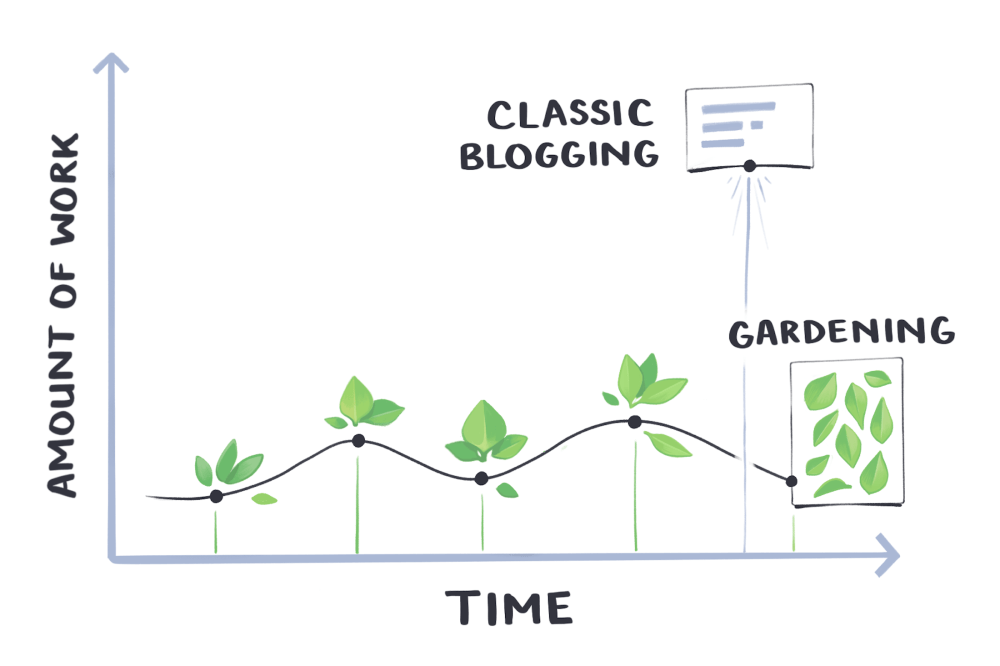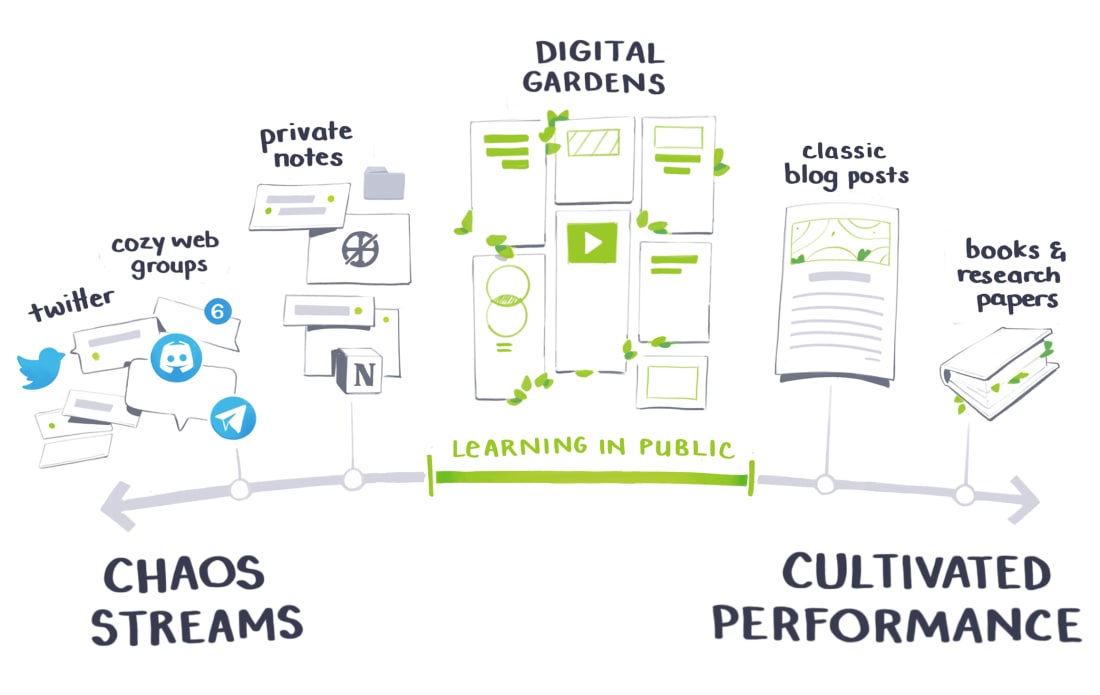Author:: [[Maggie Appleton]]
Date Finished::
Rating::
URL: https://maggieappleton.com/garden-history
Tags:: #pkm
# A Brief History & Ethos of the Digital Garden

[[Digital gardens]]
## Highlights
we have become swept away by *streams* – the collapse of information into single-track timelines of events. The conversational feed design of email inboxes, group chats, and InstaTwitBook is fleeting – they're only concerned with self-assertive immediate thoughts that rush by us in a few moments. ([View Highlight](https://read.readwise.io/read/01gest6qrthj3fg855wpny2cqf))
- Note: The way we consume information now is highly time based. We are caught in what David Perell calls the Never Ending Now. Digital gardens provide an alternative form of information consumption.
**Gardens present information in a richly linked landscape that grows slowly over time.** Everything is arranged and connected in ways that allow you to explore. Think about the way Wikipedia works when you're hopping from
to
[Celestial Mechanics](https://en.wikipedia.org/wiki/Celestial_mechanics)
to
[Dunbar's Number](https://en.wikipedia.org/wiki/Dunbar%27s_number)
. It's hyperlinking at it's best. You get to actively choose which curiosity trail to follow, rather than defaulting to the algorithmically-filtered ephemeral stream. **The garden helps us move away from time-bound streams and into contextual knowledge spaces.** ([View Highlight](https://read.readwise.io/read/01gest79qqr0d2w3b5egw10jjk))
- Note: Gardens let you follow your own curiosities similar to the way Wikipedia lets you travel down rabbit holes and your own linked notes in Obsidian or Roam Research let you hop about ideas. Except you get to follow your own curiosities and wonders.
There are a few guiding principles, design patterns and structures people are rallying around. This amounts to a kind of digital gardening ([View Highlight](https://read.readwise.io/read/01gestp0d4g22n47jbm752cg15))
1. Topography over Timelines ([View Highlight](https://read.readwise.io/read/01gestp2ak2017hdd63nws2y1q))
Gardens are organised around **contextual relationships and associative links** ([View Highlight](https://read.readwise.io/read/01gestp69ckrm9jset04ph3c76))
 ([View Highlight](https://read.readwise.io/read/01gestnsa7a7aw7sdxxz02agwd))
2. Continuous Growth ([View Highlight](https://read.readwise.io/read/01gestpcbxzgbyzv8h18t5n3dn))
 ([View Highlight](https://read.readwise.io/read/01gestnpag8cm4qtbq8cfjy5ex))
In performance-blog-land you do that thinking and researching privately, then shove it out at the final moment. A grand flourish that hides the process.
In garden-land, that process of researching and refining happens on the open internet ([View Highlight](https://read.readwise.io/read/01gestnm3bkpp2cwpe7rj4d6m5))
- Note: This takes away tons of the friction from writing. Especially with Obsidian Publish, you can choose when to output an idea you have to the outside world. You don’t have to publish a page until your comfortable doing so but you still can if you want to.
3. Imperfection & Learning in Public ([View Highlight](https://read.readwise.io/read/01gestsfzcbrwrrb7bb03xbhkt))
Gardens are **imperfect by design**. They don't hide their rough edges or claim to be a permanent source of truth ([View Highlight](https://read.readwise.io/read/01gestsn41mhq78j76n09pgrn6))
 ([View Highlight](https://read.readwise.io/read/01gestv1rg4afa6xzq3kjws6cg))
This freedom of course comes with great responsibility. Publishing imperfect and early ideas **requires that we make the status of our notes clear to readers.** You should include some indicator of how "done” they are, and how much effort you've invested in them. ([View Highlight](https://read.readwise.io/read/01gestwrkah2txaf5g0hacd22g))
This could be with a simple categorisation system. I personally use an overly horticultural metaphor: ([View Highlight](https://read.readwise.io/read/01gestx4en12c0b1ta3e235vxd))
🌱 *Seedlings* for very rough and early ideas ([View Highlight](https://read.readwise.io/read/01gestx66c24zpenf527bybp6d))
🌿 *Budding* for work I've cleaned up and clarified ([View Highlight](https://read.readwise.io/read/01gestx7x06mzvvx5164nbpvw6))
🌳 *Evergreen* for work that is reasonably complete (though I still tend these over time). ([View Highlight](https://read.readwise.io/read/01gestx9w2q5qgmf4fwpf10q6f))
4. Playful, Personal, and Experimental ([View Highlight](https://read.readwise.io/read/01gesv2mqckdp4awexnq8e6pdp))
Gardens are non-homogenous by nature. You can plant the same seeds as your neighbour, but you'll always end up with a different arrangement of plants ([View Highlight](https://read.readwise.io/read/01gesv2qpaxe7rhfvr4gdev6bc))
Author:: [[Maggie Appleton]]
DateFinished::
URL:: https://maggieappleton.com/garden-history
Rating::
Tags:: #📩 #🟥 #pkm
# A Brief History & Ethos of the Digital Garden

## Highlights
we have become swept away by *streams* – the collapse of information into single-track timelines of events. The conversational feed design of email inboxes, group chats, and InstaTwitBook is fleeting – they're only concerned with self-assertive immediate thoughts that rush by us in a few moments. ([View Highlight](https://read.readwise.io/read/01gest6qrthj3fg855wpny2cqf))
- Note: The way we consume information now is highly time based. We are caught in what David Perell calls the Never Ending Now. Digital gardens provide an alternative form of information consumption.
**Gardens present information in a richly linked landscape that grows slowly over time.** Everything is arranged and connected in ways that allow you to explore. Think about the way Wikipedia works when you're hopping from
to
[Celestial Mechanics](https://en.wikipedia.org/wiki/Celestial_mechanics)
to
[Dunbar's Number](https://en.wikipedia.org/wiki/Dunbar%27s_number)
. It's hyperlinking at it's best. You get to actively choose which curiosity trail to follow, rather than defaulting to the algorithmically-filtered ephemeral stream. **The garden helps us move away from time-bound streams and into contextual knowledge spaces.** ([View Highlight](https://read.readwise.io/read/01gest79qqr0d2w3b5egw10jjk))
- Note: Gardens let you follow your own curiosities similar to the way Wikipedia lets you travel down rabbit holes and your own linked notes in Obsidian or Roam Research let you hop about ideas. Except you get to follow your own curiosities and wonders.
There are a few guiding principles, design patterns and structures people are rallying around. This amounts to a kind of digital gardening ([View Highlight](https://read.readwise.io/read/01gestp0d4g22n47jbm752cg15))
1. Topography over Timelines ([View Highlight](https://read.readwise.io/read/01gestp2ak2017hdd63nws2y1q))
Gardens are organised around **contextual relationships and associative links** ([View Highlight](https://read.readwise.io/read/01gestp69ckrm9jset04ph3c76))
 ([View Highlight](https://read.readwise.io/read/01gestnsa7a7aw7sdxxz02agwd))
2. Continuous Growth ([View Highlight](https://read.readwise.io/read/01gestpcbxzgbyzv8h18t5n3dn))
 ([View Highlight](https://read.readwise.io/read/01gestnpag8cm4qtbq8cfjy5ex))
In performance-blog-land you do that thinking and researching privately, then shove it out at the final moment. A grand flourish that hides the process.
In garden-land, that process of researching and refining happens on the open internet ([View Highlight](https://read.readwise.io/read/01gestnm3bkpp2cwpe7rj4d6m5))
- Note: This takes away tons of the friction from writing. Especially with Obsidian Publish, you can choose when to output an idea you have to the outside world. You don’t have to publish a page until your comfortable doing so but you still can if you want to.
3. Imperfection & Learning in Public ([View Highlight](https://read.readwise.io/read/01gestsfzcbrwrrb7bb03xbhkt))
Gardens are **imperfect by design**. They don't hide their rough edges or claim to be a permanent source of truth ([View Highlight](https://read.readwise.io/read/01gestsn41mhq78j76n09pgrn6))
 ([View Highlight](https://read.readwise.io/read/01gestv1rg4afa6xzq3kjws6cg))
This freedom of course comes with great responsibility. Publishing imperfect and early ideas **requires that we make the status of our notes clear to readers.** You should include some indicator of how "done” they are, and how much effort you've invested in them. ([View Highlight](https://read.readwise.io/read/01gestwrkah2txaf5g0hacd22g))
This could be with a simple categorisation system. I personally use an overly horticultural metaphor: ([View Highlight](https://read.readwise.io/read/01gestx4en12c0b1ta3e235vxd))
🌱 *Seedlings* for very rough and early ideas ([View Highlight](https://read.readwise.io/read/01gestx66c24zpenf527bybp6d))
🌿 *Budding* for work I've cleaned up and clarified ([View Highlight](https://read.readwise.io/read/01gestx7x06mzvvx5164nbpvw6))
🌳 *Evergreen* for work that is reasonably complete (though I still tend these over time). ([View Highlight](https://read.readwise.io/read/01gestx9w2q5qgmf4fwpf10q6f))
4. Playful, Personal, and Experimental ([View Highlight](https://read.readwise.io/read/01gesv2mqckdp4awexnq8e6pdp))
Gardens are non-homogenous by nature. You can plant the same seeds as your neighbour, but you'll always end up with a different arrangement of plants ([View Highlight](https://read.readwise.io/read/01gesv2qpaxe7rhfvr4gdev6bc))